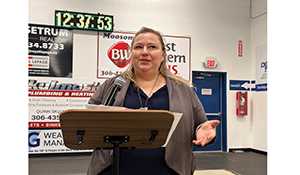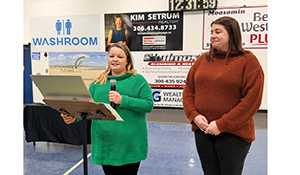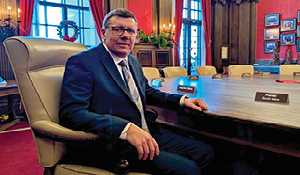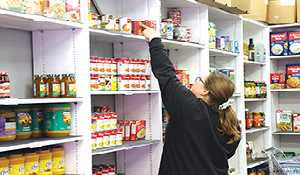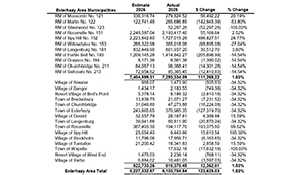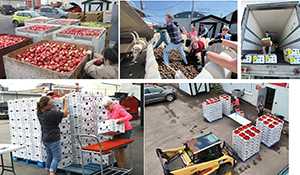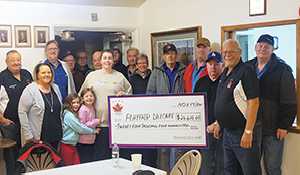Former national team hockey player Jessica Campbell reflects on women in the sport and transition into coaching
February 16, 2021, 4:26 pm
Rob Paul, Local Journalism Initiative Reporter
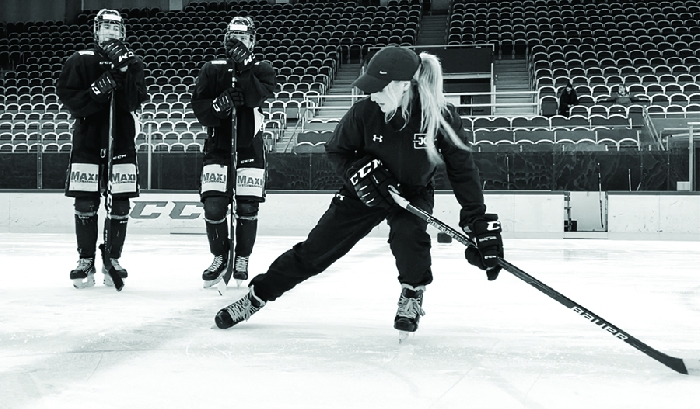

Many kids grow up with dreams of playing sports at the professional level and one day representing their country, but very few are ever able to come even close to achieving those dreams. A percentage of a percentage are able to reach that level of playing the sport they love.
For Rocanville’s Jessica Campbell, she was able to make those dreams a reality in a time when there weren’t nearly as many opportunities for women in sports as there were for men.
At 28, Campbell has accomplished a lot in a short time, going from star rural Saskatchewan hockey player to playing in the Frozen Four at Cornell to being part of Team Canada and bringing home multiple medals to playing professionally in the CWHL for the Calgary Inferno.
In 2017, Campbell retired from the national team, the team she always dreamt of playing for, to begin her transition into coaching. She’s now the owner of JC Powerskating where she trains hockey players to improve their mechanics, efficiency, and skills as skaters—among the players she trains are Olympic gold medalist Natalie Spooner, Stanley Cup champion Joel Edmundson, and former first-round pick Tyson Jost.
Having grown up in a rural area where at the time hockey wasn’t as accessible for women, Campbell credits her big dreams as the reason she pushed past some of the barriers to reach the pinnacle of the sport getting to represent Canada.
“I think I was very fortunate,” she said. “In female hockey specifically, I had a very unique path and route coming out of Saskatchewan. Female hockey is a growing sport and there’s a reason for that with increased opportunities and places to play, but for me more than 10 years ago when I first began, it was a very different world for young girls looking up to female hockey players because there was only the Olympic team. I didn’t even have that realization of what could this look like—that was in my early pre-teens—and getting to play girls hockey for the first time and figuring out that I could make Team Canada and that was ultimately the dream. It began with me dreaming of playing in the NHL and as crazy as that sounds, I played boy’s hockey and that’s all I ever knew.
“Knowing now that young girls have role models and athletes, not just one Hayley Wickenheiser, but so many names in the game to look up to in so many different ways, it carries a lot of meaning behind why we’re doing it and who we’re doing it for because one day there will be a time where hopefully there’s a paid professional league and we can know we did our part as pioneers in the game and pushing through the barriers and the set backs that we face with the gender inequality in the sporting world and female industry. I think for me it was always a privilege and never a right, it was always an honour to be able to represent Canada and Saskatchewan and to go to Cornell.
“That’s maybe just a small-town mentality, we were grateful and constantly pushing to pursue goals that are maybe harder to pursue than when you’re coming up in a city and there’s more opportunities, coaches, and organizations to get involved with.
“I know my parents had to drive me hours and hours week to week and weekends and to summer camps—they did a lot, more than I could ever imagine, and that was what ultimately allowed me to take those steps,” she said. “I think for young girls now looking up to any female athlete, the sky is the limit. There’s no barriers stopping them from doing what they love, there’s opportunities and a space for everyone, and a level to challenge themselves to.
“If I were a young girl now just lacing up my hockey skates I would want someone to tell me that you can go as far as you possibly want in this sport. Dream big and go for it because at the time, my naive self dreamt of playing in the NHL and nobody ever said you can’t do that—my parents never once said it’s crazy and that I wouldn’t be able to play with the boys at that level and I think because I had that dream and the vision of perusing it as far as I could go, I didn’t have any barriers and there were no limits. I’m constantly reminding myself when I’m working with young athletes—girls and boys—that we need to empower them to embrace whatever it is that they’re passionate about and love to do.”
For young athletes, both men and women, Campbell’s biggest piece of advice is to set the highest of goals because whether they’re attained or not, the experiences gained in athletics will positively shape them for the rest of their lives.
“Within sports, we need to continue to inspire them to reach and challenge themselves because there are so many important skills and values that come out of athletics,” she said. “There’s so much that has come out of hockey for me that transfers into my every day life that I can take into the work place, can use as a professional, and into relationships and friendships—it’s a trait that’s unique to experiencing and developing on teams.
“For every young kid out there, that would be my biggest piece of advice as cliche as it sounds, dream as big as you possibly can and go for it and don’t let anyone ever tell you that you can’t no matter where you’re from, what your gender is, or however big or small you are because I’m living proof of that.
“Knowing the statistics of it—I think it’s 0.0003 per cent of girls in hockey that are registered in Canada will get the opportunity to play for Team Canada—and if someone told me that when I was 10, I still would have kept going because I believed in it and I loved it. I want all kids to know that even though right now there’s no professional league, that’s going to be the push and that push is for them and inspiring them to keep doing what they love because one day there will be a world where they can do what they love and get paid for it.”
Now that her playing days are over and she’s beginning her journey as a coach, Campbell admits it was never something she thought about at first, but reflecting on how important hockey camps and coaching were for her as a young girl, it pushed her in this new direction.
“Transitioning to coaching, I never actually dreamt of being a coach and I think when you’re in the middle of a playing career you don’t think about it,” she said. “You do think about what you’re going to do after hockey because you can’t play until you’re 70 years old, but for me, I never thought that I wanted to be a coach. What I knew as I was playing and running hockey camps—I actually started running my camp in Ochapowace about five years ago when I was still playing—I was running that camp because for me being a female pioneer to carry the representation of the prairies, I had Colleen Sostorics and those players that were the pioneers when I was a young girl, hosting hockey camps in Whitewood.
“I remember going to those camps and those were the camps that fuelled my passion, my drive, and the motivation behind it—had the Colleen Sostorics and the Brandy Wests not hosted those camps, who knows if I would have ever been that driven, motivated, and inspired to pursue my goals.
“When I was playing, I had an opportunity to give back and I thought if I had a camp in small-town Saskatchewan where maybe the camps aren’t as prevalent then so many kids from all these small towns could come together and get to experience what I once got to experience and if that changes a life or inspires a dream then it’s all worth it. I started running these camps and after my first year I sort of stepped back and realized how passionate I am about teaching power skating and how skating was one of my strongest skills as a player and a skill that set me apart from my peers.
“That inspired me to think that one day I’d want to teach power skating—to what capacity I didn’t know, but I knew it was definitely something that made me tick and I was good at it and loved it,” she said. “Transitioning from playing to coaching was easy because I was still around the game on a daily basis and I was now being able to work in the development role for players who were in my shoes on that same path with that same trajectory where they have a goal of making the national team and pursuing college scholarships. I think it was difficult stepping away from not being in it myself, but because I was working and inspiring and focused on my players betterment, it opened my eyes to a whole other world of coaching and the impact that coaches have.”
Having the chance to take what she learned as a player and what she saw from coaches to help develop her own coaching style has helped her quickly take off with her business and has allowed her to blend her love of the game with the opportunity she has to be a role model and inspiration to athletes.
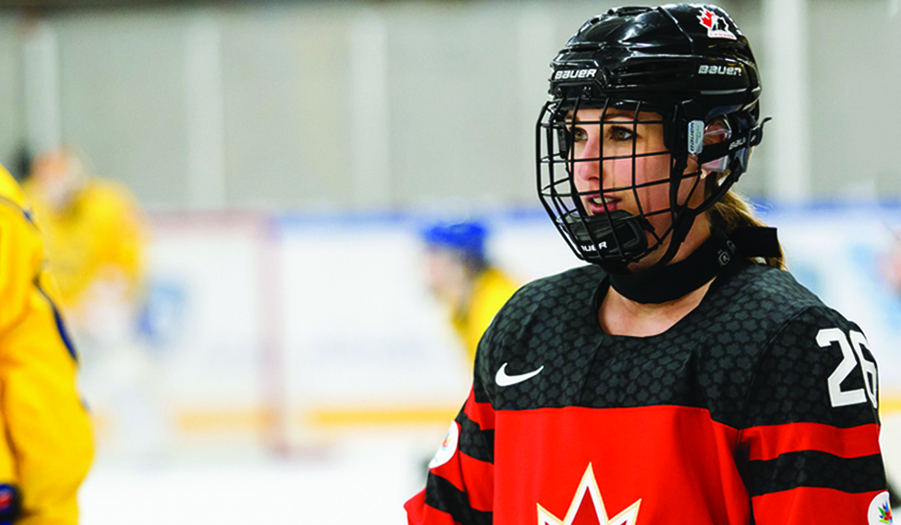

“Having so many great coaches and not so great coaches throughout my career also helps to shape your own beliefs and values in coaching. Taking that step and only being a few years out of playing, I’ve seen huge steps in my own journey as a coach because, again, I didn’t know I wanted to do this but now that I’m in it I’m just constantly pushing the envelope of how far can I take this. Just this past year I was really fortunate to step into coaching the mens game as a female in a male dominated industry—there’s not a ton of females, there’s more growing every day, but we’ve got to keep pushing and challenging as female leaders in these roles.
“For me with skating and skill development it was never about me being a female, it was always about hockey and I need to work with athletes and that brought me full-circle with how it all started—it was always just a game and it wasn’t about girls or boys hockey, it was just about hockey.
“I’ve been very fortunate to be able to take the steps to start my own business and started working with 15-plus NHL clients and worked over in Sweden with a men’s pro team, all of that has just created this momentum for building my business and clientele and continuing to establish myself as a female leader for youth for them to know they can breakdown any barriers. If you’re passionate about what you do and good at what you do then you can breakdown any barriers that are set in front of you.”
It wasn’t easy for Campbell to step away from the game, but coaching has come naturally to her with her desire to learn and help others get better while showing them anything is possible if you put your heart and soul into it.
“I knew through the end of my career that power skating was something I loved to do so I just followed my heart on that path,” she said. “It was emotional moving on from the game but transitioning into coaching was seamless because of my passion for it. I realized there’s a place for this in this field, skating and skills coaches are sought after more than ever on the professional level both for the mens and women’s game. Hockey has come so far and if you look at the best players now in the NHL, there skills and skating—you look at a McDavid, a Matthews, and a McKinnon—they’re dominating everybody else because their individual skills and skating are so much higher than the others.
“The role of having skills and skating coaches has been growing and so I’ve been very fortunate to be part of that movement and to be part of the momentum of that path. It hasn’t been about my career as a player, it’s been about my ability and my knowledge base as a coach and that’s the most exciting thing for me now. Even going on Battle of the Blades, the coach in me was trying to figure out why certain things feel the way they do on a figure skate vs. hockey skate—I’m constantly pushing my expertise to understand the difference between the two sports and also how there’s transferable concepts to overall skating. It’s a really exciting time and despite Covid, I’m excited about the future of my impact in the sport and all the players and professionals I get to work alongside and inspiring athletes to meet their highest potential.” Tweet








